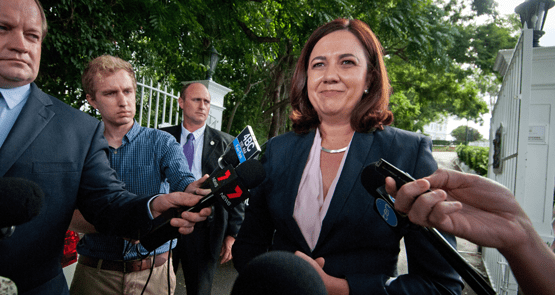
When the Queensland Parliament reopened this week, Premier Annastacia Palaszczuk issued writs for local government elections to be held on March 19. Everybody, give a big yawn …
However, for once, the campaign for control of the 74 town halls across the sunshine state has a political urgency for Palaszczuk — whose minority Labor government is hanging by a knife edge — and for the federal election later this year.
A swing against the ALP at the March council elections will boost the LNP state opposition and hearten Prime Minister Malcolm Turnbull’s bid to hold onto the 22 Queensland seats won by Tony Abbott in September 2013.
Just over 12 months ago, Palaszczuk’s party barged into office at the state election ousting Campbell Newman from the premiership as well as from his seat of Ashgrove.
She has managed to hang onto solid polling numbers but her early performance has been marred by an over-emphasis on process and a neglect of delivery.
In sharp contrast, NSW Premier Mike Baird has created a delivery unit in the Department of Premier and Cabinet whose sole function is to monitor, cajole and drive the implementation of projects promised in the election manifesto.
The inflexible Queensland bureaucracy shows no sign of surrendering its power to decide on policy and the pace of reform. If the Premier suffers an election defeat, the self-serving bureaucracy doesn’t give a rats; it survives to suffocate the delusional ambitions of the next incumbent.
Local election flashpoints will be Brisbane City Council, Australia’s largest council, currently administered by lord mayor Graham Quirk of the LNP; Gold Coast City Council where lord mayor Tom Tate is recontesting; the Maroochydore-based Sunshine Coast Regional Council; and coastal councils around Maryborough, Rockhampton, Mackay, Townsville and Cairns.
Mayoral candidates will face a new voting system at next month’s poll. The optional preferential system is being introduced which will allow voters to indicate first, second or third preferred candidates.
Gold Coast businessman Tom Tate spent $340,000 of his own money to win the mayoralty in 2012 while others say the total outlay was closer to $1 million, making it the most expensive mayoral election campaign in the country’s history.
Independent candidates opposed to Tate hope that preference deals will make it easier to unseat the pro-casino and pro-developer incumbent.
When council election day comes around on March 19, voters will be asked to take part in a referendum approving the introduction of fixed four-year terms for Queensland’s Legislative Assembly.
The “yes” vote has bipartisan support and, if passed, will bring Queensland into line with every other state in the Commonwealth. Because Queensland is the only state without an upper house — the legislative council was abolished in 1922 — some wary opponents argue that a successful vote is essentially undemocratic because it will enshrine single-party rule for four-year terms instead of three.
The Queensland Local Government Association is opposed to the referendum, complaining that it intruded on the sanctity of council elections, which should be about local issues and not state politics.
On March 23, 1991 Queenslanders rejected by a simple majority an earlier bid to introduce four-year fixed terms with 772,647 (48.9%) in favour and 881,078 (51.1% against).
This time around, Palaszczuk and the Queensland Electoral Commission are spending millions of dollars on advertising to persuade Queenslanders to support the change.
However, their biggest challenge appears to be increasing voter turnout. At the last local government elections in 2012, almost 400,00 people who were eligible to vote were “missing” from the electoral roll because they had not registered.
There was a significant increase in voter registration on the eve of the 2015 state election when 21,000 young people between 18 and 24 registered but the overall turnout was still lower than some other states.
As a result, QEC issued “please explain” notices to tens of thousands of people across the state and many were forced to pay substantial fines. The penalty for failing to vote was recently increased from $113 to $117 but offenders are also obliged to pay a sliding scale of interest charges if they don’t cough up immediately.
The electoral authorities have given themselves a modest target of an 85% turnout for the March council poll, which appears to indicate a lamentable acceptance of the anti-state, non-participatory “feral” culture in the sprawling Outback and the isolated coastline havens from Hervey Bay to Cape York.








Alex, at the last Brisbane council elections, 1 in 10 people did not vote because it was raining. Add that to the 1 in 10 people that never bother to vote. That’s 1 in 5 people not bothering to vote. How would these people go about explaining their inaction to someone from a fledgling democracy? I would like to think that the ECQ (not QEC) caught up with them all as you suggest but I think it unlikely.